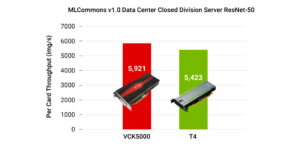
EDACafe Editorial Roberto Frazzoli
Roberto Frazzoli is a contributing editor to EDACafe. His interests as a technology journalist focus on the semiconductor ecosystem in all its aspects. Roberto started covering electronics in 1987. His weekly contribution to EDACafe started in early 2019. Record EDA-IP revenues; new fabs; Xilinx Vitis AI 1.4; quantum advancementsJuly 23rd, 2021 by Roberto Frazzoli
Quarterly result announcements – either from Q1 or Q2 – make up a significant part of this week’s news roundup. Manufacturing capacity expansion continues to be a hot topic, but there is no shortage of other updates. Quantum computing research is also in the news with two announcements. Record EDA and IP revenues in Q1 2021 According to the latest report from the ESD Alliance, in Q1 2021 the Electronic System Design industry revenue increased 17% to $3,157.17 million, marking the strongest first-quarter growth ever. The four-quarter moving average, which compares the most recent four quarters to the prior four, rose 15%, the highest annual growth since 2011. All product categories significantly contributed, with double-digit growth in the CAE, IC physical design/verification, PCB/MCM, and semiconductor IP segments. Geographically, the Americas, EMEA and APAC regions also reported double-digit growth. Outstanding figures have been achieved by IC physical design and verification revenue, which surged 34.4% to $682.5 million compared to Q1 2020; and by the Asia Pacific revenue, which increased 26.9% to $1,166.3 million compared to Q1 2020. Quoted by Semiconductor Engineering, Wally Rhines – executive sponsor of SEMI‘s Electronic Design Market Data Report – underlined the Chinese figures: “Year on year, the revenue in China was up 73%. And if you look at EDA only, separate from IP, it was up 99%,” he reportedly said. EDA updates: Ansys cloud support, Julia Computing funding In collaboration with Arm, Ansys is enabling simulation solutions for AWS Graviton2 processors, a more affordable way to access Amazon Web Services cloud computing resources. The initiative marks the first availability of Ansys’ semiconductor simulation solutions on the Arm Neoverse architecture. Beginning with the APL (Ansys Power Library) characterization tool, Ansys will offer more of its semiconductor analysis software product suite, supporting the Arm Neoverse architecture that is used by AWS Graviton2-powered Amazon Elastic Compute Cloud instances.
Julia Computing has completed a $24M Series A fundraising round led by Dorilton Ventures, with participation from Menlo Ventures, General Catalyst, and HighSage Ventures. The company has also announced that Bob Muglia, former Snowflake CEO, will join the Julia Computing Board of Directors. The funding will be used to further develop the JuliaHub cloud platform and to grow the Julia ecosystem. Julia’s EDA-related applications include JuliaSim for multi-physics simulation and JuliaSPICE for circuit simulation. According to the company, Julia solves the “two-language problem” by eliminating the two-step process of testing, modeling, and prototyping in a high-level language (such as Python, Matlab, or R), and then rewriting in a second, faster lower-level language (such as C or C++) for production and scaling. Fabs and equipment update: GloFo, TSMC, ASML GlobalFoundries CEO Tom Caulfield has reportedly dismissed the press reports of a takeover bid by Intel as “speculation”. He confirmed that his company is sticking with its plan for an initial public offering next year. GlobalFoundries has also announced an expansion plan – in private-public partnership – for its manufacturing facility in upstate New York over the coming years. The company will invest $1 billion to immediately add 150,000 wafers per year within its existing Fab 8 facility, and to build a new fab on the same campus that will double the site’s capacity. On occasion of the Q2 2021 earnings call, TSMC’s CEO C.C. Wei said that the company is “in due diligence process” to have a specialty technology fab in Japan. He also said that TSMC’s N3 technology development is on track with good progress; the company has developed a complete platform support for both HPC and smartphone applications. N3 risk production is scheduled in 2021, and production will start in second half of 2022. As for lithography equipment, on occasion of Q2 2021 results announcement, ASML CEO Peter Wennink said that the company is planning to increase its production capacity to support chipmakers and foundries expansion. On DUV equipment, the company Is aiming at a double-digit increase. On EUV equipment, the capacity for 2022 is 55 units, while for 2023 ASML is now looking to bring that capacity over 60 units. Furthermore, new machines like the NXE:3600D offer a 15 to 20% higher productivity in terms of wafer throughput. Xilinx Vitis AI 1.4 Xilinx has released Vitis AI 1.4, the latest version of its machine learning development platform for AI inference acceleration on Xilinx Adaptive Computing platforms. This release supports, for the first time, the latest 7nm Versal ACAP platforms and the 16nm-based Kria portfolio of adaptive system-on-modules. The Versal platform support includes the Versal AI Core Series VCK190 Evaluation Kit and the VCK5000 Versal Development Card for AI Inference. Xilinx has also expanded its set of free AI models, dubbed ‘AI Model Zoo’, with the addition of models for 4D radar detection, image-lidar sensor fusion, surround view 3D detection, depth estimation, super resolution etc. For users who choose to directly deploy custom neural network models, Vitis AI 1.4 is also providing new deployment APIs called ‘graph-runner’. To demonstrate the high-efficiency of domain-specific architectures in AI inference acceleration, Xilinx submitted a ResNet50 closed-division benchmark in the MLPerf Inference v1.0 results earlier this year, achieving a result of 5,921 images per second using the Versal VCK5000 PCI-E card. As Xilinx points out, this result outperformed the acceleration performance achieved by a Nvidia T4 card under the same mode. Additionally, the Versal AI Core series VCK190 achieved a ResNet50-v1.5 result of 1,567 images per second and 7.6ms latency, which is 87% higher performance and 19x lower latency than Nvidia AGX Xavier. As for the software development flow, with Vitis AI 1.4 the quantizer, optimizer and compiler tools have extended the support for Pytorch, Tensorflow 1.x, Tensorflow 2.x and Caffe. New APIs and operator features have been introduced to enable more AI models deployment across multiple devices. Quantum computing advancements: Google, Honeywell Two announcements from Google and Honeywell have recently reported advancements in quantum error correction. As explained by Google in this paper, realizing the potential of quantum computing requires sufficiently low logical error rates; many applications call for error rates as low as 10−15, but state-of-the-art quantum platforms typically have physical error rates near 10−3. In the above-mentioned paper, Google has demonstrated stable error detection event fractions while executing 50 rounds of stabilizer measurements on a Sycamore device. Researchers at Honeywell Quantum Solutions, for their part, also demonstrated repeated rounds of real-time quantum error correction. The company also achieved a quantum volume of 1,024, doubling its own record from just four months ago. Beyond the hardware milestones, Cambridge Quantum – a company recently merged with Honeywell Quantum Solutions – has also developed a new quantum algorithm that uses fewer qubits to solve optimization problems. The Honeywell paper concerning real-time fault-tolerant quantum error correction is available here. Acquisitions Acquisition-related news this week include updates on a deal that will not take place, and rumors about a company seeking for investors. Autodesk has announced that it has terminated discussions to acquire Altium. “We were unable to agree on the basis to advance discussions,” Autodesk CEO declared in a press release. Chinese mobile chipmaker Unisoc is reportedly searching for new anchor investors to cut ties with its troubled parent company Tsinghua Unigroup and pave the way for an IPO. Upcoming online events ICML (the International Conference on Machine Learning) is running until July 24. JuliaCon, an annual gathering for the Julia community, will take place July 28-30 as a free event. Si2 Annual Technology Forum will be held on August 6 with a special focus on cloud-based design. |
|
|
|||||
|
|
|||||
|
|||||









